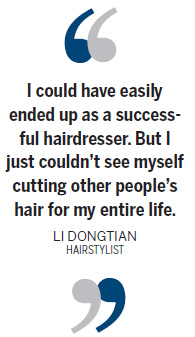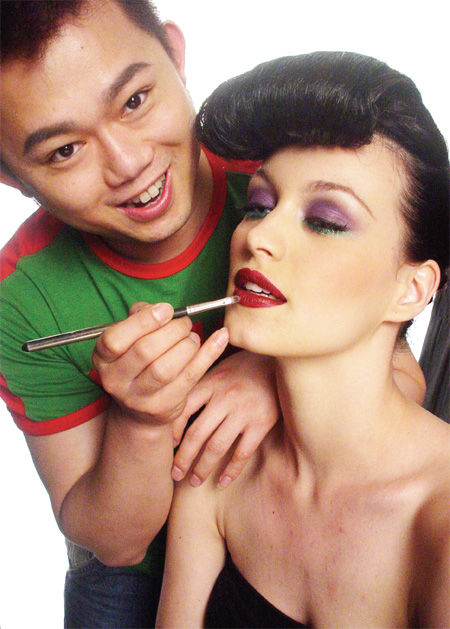Crowning achievement
Updated: 2011-07-15 13:24
By Meng Jing (China Daily European Weekly)
|
Li Dongtian is determined to blaze his own path. Provided to China Daily |
Hairstylist Li Dongtian went from high school dropout to head of a style powerhouse
When Li Dongtian started to learn how to cut hair in 1988, his dream was to become China's Vidal Sassoon, a legendary hairstylist known around world. But now, approaching his 40s, instead of overtaking Sassoon's trademark five-point geometric haircut, he is blazing his own path. As one of China's top stylists, Li, who used to work exclusively with the most famous and beautiful faces in the country, has gradually marched into the business world.
He has opened dozens of hair salons and stylist training schools, allowing more Chinese to benefit from his fashion sense.
Before the age of 16, Li considered attending a Beijing cosmetics school to learn how to make a living using a pair of scissors.
He was a self-described lousy student who was desperately trying to figure out what to do when he inevitably failed to get into senior high school.
Neither of his parents, who were engineers, supported his decision to become a hairdresser.
"I guess it was my poor grades that persuaded them in the end," he says.
Once enrolled in the cosmetics school, Li got a chance to model in a commercial. He volunteered to do the other models' hair and his skills impressed the director.
Li's reputation spread quickly in the 1990s, before China had much of a fashion industry. Before he left for the United States in 1994, he was an award-winning stylist who had a growing list of celebrity clients in China.
Few people understood his decision of leaving everything behind and going abroad. But Li regarded the two years in the US as one of the best decisions in his life.
Apart from frequently visiting fashion shows, Li was inspired by his time in the US. He had decided to build his own fashion empire.
"I noticed that most stylists in the US work as a team and they are managedby agencies. Some do hair, and some do makeup. They work like an assembly line.
Then I thought, 'Wow, that's a good way to do business,' " Li says in Chinese, occasionally throwing in an English word.
Things have been growing from the idea of running a stylist agency, which is typically hired for special events, such as weddings, photo shoots or fashion shows. In order to survive, an agency needs enough good stylists and enough deep-pocket customers to produce profits.
For Li, the best solution was to open his own stylist training school and his own hair salon.
His first hair salon, Tony Studio, was founded in Beijing in 1999. Ever since then, Li has been adding more titles to his resume.
He is a stylist, a teacher, and a celebrity who has nearly 1.6 million followers on Sina.com's micro blog. But what he likes most is the title of successful businessman.
"I could have easily ended up as a successful hairdresser. But I just couldn't see myself cutting other people's hairformy entire life," he says.
The junior high school graduateis now the chairman of Dongtian Fashion Culture Broadcasting Co, which includes about 30 hair salons, stylist training schools, a stylist agency, cafes and gyms.
The expansion of his business shares some similarities with his role model, Giorgio Armani. Armani is a successful Italian designer whose luxury fashion brands include not only clothes, but perfumes and cafes.
|
 |
"No one can combine fashion, art and business as perfectly as Armani," Li says, adding his ambitious plan is to run his company with a mind of a businessman but with the vision of an artist.
His idea attracted investment from Sequola Capital, one of the top venture capital firms in the world in 2010. This followed China Equity's tens of millions yuan of investment in 2009.
Apart from the well-established status of Tony Studio, Li attributes the flow of cash to China's booming hairstyle industry.
"On average, people have to cut their hair every three to five weeks. It is a basic need of all human beings, like having to eat or sleep," he said. "But with the economic growth, people expect more from hair stylists. They all have their individual requirements. They want something special, something to suit themselves," he says.
The surging demand inevitably is having a positive effect on Li's hair salon business, which is growing at 30 percent annually.
Despite only opening 18 hair salons in the first 10 years, Li is expecting a more rapid development for his business, especially after receiving the strong financial help from the two venture capital firms.
He refuses to reveal the investment numbers; only saying the investment is "good enough".
More openings of the high-end Tony Studios are on their way. Around 500 lower-end hair salons, named DT Space, are expected to open in the next five years in China. These salons are targeted at white-collar customers between the ages of 18 and 30.
Li selected his own Cozy Caf for a recent interview. He ordered an American-style cup of coffee loaded with sugar and milk, his usual. It was a necessary boost after arriving in Beijing at 3 am that day following a business trip to Shenzhen to discuss the location of his new salon. It was already 3 pm and the day was wearing on him.
"My plan is to make my salon the top three in China. When people think about haircuts, Tony Studio or DT Space will be one of their first three options," he says.
It was the businessman talking. But the creative side of Li can still be seen in the details of the cafe - Wh
E-paper

Pearl paradise
Dreams of a 'crazy' man turned out to be a real pearler for city
Literary beacon
Venice of china
Up to the mark
Specials

Power of profit
Western companies can learn from management practices of firms in emerging economies

Foreign-friendly skies
About a year ago, 48-year-old Roy Weinberg gave up his job with US Airways, moved to Shanghai and became a captain for China's Spring Airlines.

Plows, tough guys and real men
在这个时代,怎样才"够男人"? On the character "Man"

